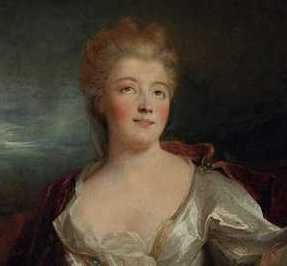Life On the Rocks
Emilie Made Voltaire Look Stupid and He Adored Her For It.

A Love Story for the Ages
IN 1733, in France, twenty-seven-year-old Emilie du Chatelet, a married aristocrat, met the almost forty-year-old Voltaire and became his lover. She had been married off young, French style, to an older aristocrat who could prove four hundred years of aristocratic blood. She'd provided the requisite heirs, and both husband and wife were then free to pursue love wherever they could find it.
She found it in the arms of one of the great intellectual giants of the French Enlightenment, a sometimes hunted man, due to his forward thinking views, which he took little trouble to conceal. A highly educated woman, in a country where women were never educated, Emilie spoke five languages, and studied math with two of the greatest mathematicians in world history, Johann Bernoulli and Clairaut.
She was the first woman to have a scientific paper published by the Paris Academy of Sciences, which sponsored a competition one year to determine the nature of heat, light and fire. Voltaire spent millions, in today's dollars, buying equipment to heat, weigh and take the temperature of molten metals. He broke a lot of thermometers in those molten metals, but learned very little about the nature of heat, light and fire.
His paramour, Emilie, got busy with her pencils and calculated that, if light was moving at a billion feet per second, then if light was a particle, even the most infinitesimal quantity of it bombarding the earth would destroy all living beings. She dared advance the startling and unheard of idea that "light was something that had no mass at all." Further, she had plans to repeat Newton's experiments with the prism, in which he'd separated white light into colors, except Emilie was going to put thermometers in each of the different colors of the rainbow lights, hypothesizing that "different colors of light would carry different amounts of heating power." Eighty years elapsed before anyone got around to trying this, and thus discovering infrared light.
Emilie did not get to carry this experiment out, because Voltaire had to make a hasty exit to escape arrest by the King for advancing anti-Church and anti-Royalist ideas.
From Wikipedia: "In 1749, the year of her death, she completed the work regarded as her outstanding achievement: her translation into French, with her commentary, of Newton's 'Principia Mathematica', including her derivation of the notion of conservation of energy from its principles of mechanics. Published ten years after her death, today du Chatelet's translation of Principia Mathematica is still the standard translation of the work into French."
She made the translation and discovered the notion of the conservation of energy all while pregnant at forty-three years old. Tragically, she died a few days after the birth of her child. It was not Voltaire's child, but another man's, for Voltaire was by then much older and not an attentive lover.
I suppose what strikes me so forcibly about Emilie's story is the idea of this brilliant woman enduring a dangerous, late-stage pregnancy, while translating from Latin into French, Newton's book of mathematics, in which he introduces calculus to the world. Calculus is tough for the best of us, under any circumstances, but she mastered it while pregnant, and in her forties, and not in her native tongue. And additionally, she discovered the idea of the conservation of energy, which she added to her translation.
Seems to me Emilie is proof that women need never apologize that they don't appear in the history books quite as often as men. Having babies either left them with little time for creating works of prodigious scholarship or ended their lives prematurely.
Emilie was an extraordinary prodigy, who overcame all the immense hurdles, natural and cultural, that so often stand in the way of outstanding female accomplishments. And she was loved by another great intellectual.
Long after her death, Voltaire wrote this of her:
"I shall await you, quietly
In my meridian
in the fields of Cirey
Watching one star only
Watching my Emilie."
By Voltaire, "Ode"
The quotes are from the book "Passionate Minds" by David Bodanis. A book about two incredibly daring, intelligent and passionate people, both of whom changed the world in very great ways. It's a great story, very entertaining as well as an informative book, well worth a reading.